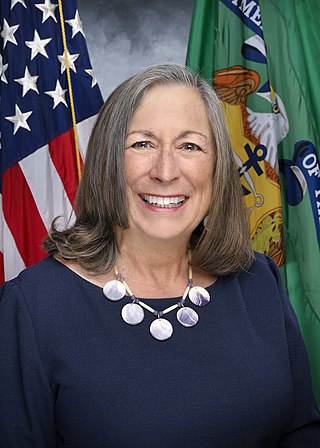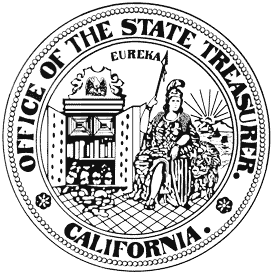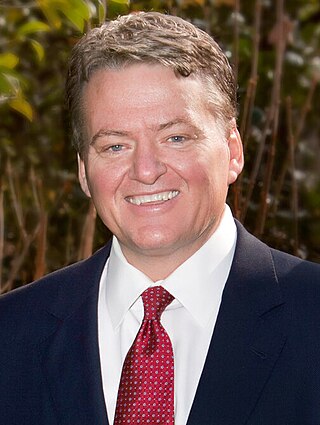Related Research Articles

The Department of the Treasury (USDT) is the national treasury and finance department of the federal government of the United States, where it serves as an executive department. The department oversees the Bureau of Engraving and Printing and the U.S. Mint. These two agencies are responsible for printing all paper currency and minting coins, while the treasury executes currency circulation in the domestic fiscal system. It collects all federal taxes through the Internal Revenue Service; manages U.S. government debt instruments; licenses and supervises banks and thrift institutions; and advises the legislative and executive branches on matters of fiscal policy. The department is administered by the secretary of the treasury, who is a member of the Cabinet. The treasurer of the United States has limited statutory duties, but advises the Secretary on various matters such as coinage and currency production. Signatures of both officials appear on all Federal Reserve notes.

The treasurer of the United States is an officer in the United States Department of the Treasury who serves as the custodian and trustee of the federal government's collateral assets and the supervisor of the department's currency and coinage production functions. As of September 12, 2022, the treasurer is Marilynn Malerba, who is the first Native American to hold the office.

The comptroller of Maryland is a constitutional officer of the U.S. state of Maryland. Thirty-four individuals have held the office of comptroller since 1851, when the office was created. The incumbent is Brooke Lierman, a Democrat.

The state treasurer of California is a constitutional officer in the executive branch of the government of the U.S. state of California. Thirty-five individuals have held the office of state treasurer since statehood. The incumbent is Fiona Ma, a Democrat. The state treasurer's main office is located in the Jesse M. Unruh State Office Building in Sacramento.
Martha Whitehead is an American politician from the U.S. state of Texas. She was the last Texas State Treasurer before the position was abolished by constitutional amendment in 1996.

The state auditor of Minnesota is a constitutional officer in the executive branch of the U.S. state of Minnesota. Nineteen individuals have held the office of state auditor since statehood. The incumbent is Julie Blaha, a DFLer.

The treasurer and receiver-general of Massachusetts is an elected constitutional officer in the executive branch of the U.S. state of Massachusetts. Originally appointed under authority of the English Crown pursuant to the Charter of the Massachusetts Bay Company, the office of treasurer and receiver-general became an elective one in 1780. Sixty-one individuals have occupied the office of state treasurer over the ensuing centuries. The incumbent is Deb Goldberg, a Democrat who took office January 21, 2015.

The State Treasurer of Oklahoma is the chief custodian of Oklahoma's cash deposits, monies from bond sales, and other securities and collateral and directs the investments of those assets. The treasurer provides for the safe and efficient operation of state government through effective banking, investment, and cash management. The state treasurer has the powers of a typical chief financial officer for a corporation.

The state treasurer of Minnesota was a constitutional officer in the executive branch of the U.S. state of Minnesota. Twenty-six individuals occupied the office of state treasurer from 1858 until the office's abolition in 2003. The final state treasurer was Carol C. Johnson, a DFLer.

The New York state comptroller is an elected constitutional officer of the U.S. state of New York and head of the New York state government's Department of Audit and Control. Sixty-one individuals have held the office of State Comptroller since statehood. The incumbent is Thomas DiNapoli, a Democrat.
In the state and territorial governments of the United States, 54 of the 56 states and territories have the executive position of treasurer. New York abolished the office of New York State Treasurer in 1926, in which the duties were transferred to the New York State Comptroller. Texas abolished the position of Texas State Treasurer in 1996, transferring the duties of that office to the Texas Comptroller of Public Accounts.

State auditors are fiscal officers lodged in the executive or legislative branches of U.S. state governments who serve as external auditors, program evaluators, financial controllers, bookkeepers, or inspectors general of public funds. The office of state auditor may be a creature of the state constitution or one created by statutory law.

The treasurer of Pennsylvania is the head of the Pennsylvania Treasury Department, an independent department of the commonwealth's government. The treasurer is elected every four years. Treasurers are limited to two consecutive terms.

The Comptroller of Illinois is a constitutional officer in the executive branch of government of the U.S. state of Illinois. Ten individuals have held the office of Comptroller since the enactment of the Illinois Constitution of 1970, replacing the prior office of Auditor of Public Accounts that was first created in 1799. The incumbent is Susana Mendoza, a Democrat.

The Treasurer of Illinois is a constitutional officer in the executive branch of government of the U.S. state of Illinois. Seventy-four individuals have occupied the office of Treasurer since statehood. The incumbent is Mike Frerichs, a Democrat. A former Champaign County auditor and state senator, Frerichs was first elected to lead the state treasury in 2014 following a close race with Republican candidate Tom Cross.
The state treasurer of Wisconsin is a constitutional officer in the executive branch of the government of the U.S. state of Wisconsin. Thirty-six individuals have held the office since statehood. The incumbent is John Leiber, a Republican.

The Texas Comptroller of Public Accounts is an executive branch position created by the Texas Constitution. The comptroller is popularly elected every four years, and is primarily tasked with collecting all state tax revenue and estimating the amount of revenue that the Texas Legislature can spend each biennium. The current comptroller is Glenn Hegar, who took office on January 2, 2015.

The Ministry of Finance, abbreviated MOF, is a ministry of the Government of Malaysia that is charged with the responsibility for government expenditure and revenue raising. The ministry's role is to develop economic policy and prepare the Malaysian federal budget. The Ministry of Finance also oversees financial legislation and regulation. Each year in October, the Minister of Finance presents the Malaysian federal budget to the Parliament.
In Malaysia, federal budgets are presented annually by the Government of Malaysia to identify proposed government revenues and spending and forecast economic conditions for the upcoming year, and its fiscal policy for the forward years. The federal budget includes the government's estimates of revenue and spending and may outline new policy initiatives. Federal budgets are usually released in October, before the start of the fiscal year. All of the Malaysian states also present budgets. Since state finances are dependent on money from the federal government, these budgets are usually released after the federal one.

The state treasurer of South Carolina is a constitutional officer in the executive branch of the U.S. state of South Carolina. Twenty one individuals have held the office of state treasurer since it became an elective position in 1865. The incumbent is Curtis Loftis, a Republican.
References
- ↑ Verhovek, Sam Howe (30 October 1994). "THE 1994 CAMPAIGN: TEXAS; Candidate Seeks Job She Would Cut". The New York Times.
- ↑ "Archived copy". Archived from the original on 2006-11-08. Retrieved 2007-01-03.
{{cite web}}: CS1 maint: archived copy as title (link) - ↑ "Texas Treasury Department Office of the General Counsel Litigation Files: An Inventory of Treasury Department Office of the General Counsel Litigation Files at the Texas State Archives, 1967-1986".
- ↑ "TSHA | State Treasurer".